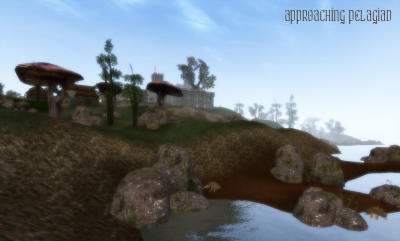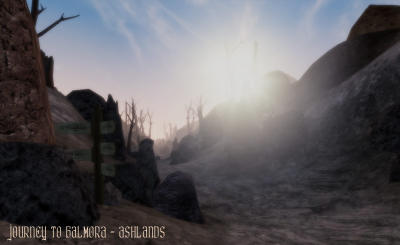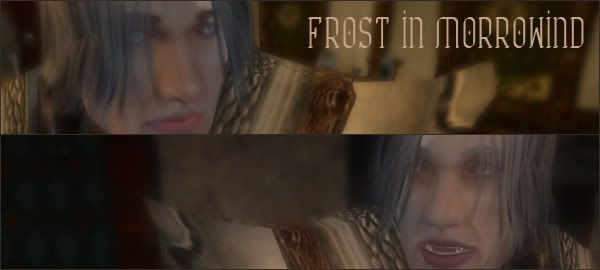Chapter 7: A Debt
Pelagiad is a small village that lies just inside the Ascadian Isles region, less than an hour's walk north-east from Seyda Neen. That is what I had learnt at Arille's tradehouse when inquiring about the area surrounding Seyda Neen, at least. Some of the residents of the seaside village spoke about Pelagiad with dreamy expressions, explaining that the climate and job opportunities were much more favourable there. They were certainly right about the climate, I noted as I descended from the short mountain pass between the villages, entering an area of sparkling lakes and rolling hills. The oppressive humidity of the swamps along the coast had lifted during my morning walk to Pelagiad. It was still warm enough to make me sweat as I trudged along in the sun, but the occasional cool breeze made the trip quite pleasant.
People in Seyda Neen had recommended that new arrivals to Vvardenfell island take a silt strider - the intriguing local transport in the area - when travelling between towns, as it was much safer. They told me that any creature that might pose a danger along the roads - wild animal or bandit - knew that to attack a silt strider was to receive a bone-breaking kick from a leg the size of a tree-trunk. While that sounded reassuring (in a way), I had decided to walk as I felt that after my extended stay in a cramped prison cell, I needed the exercise. Besides, with that black-armoured assassin presumably still looking for me, I thought that my sitting in a silt strider travelling along an established route would provide such a man with far too good an opportunity to mount an ambush.

Soon after leaving the mountain pass behind I could see Pelagiad perched along the spine of a moderate hill, its slope leading down to one of the lakes dotted throughout the region. At the hill's summit was an Imperial fort, just like any of the countless others across the empire: they spring up wherever the Imperial race touches. Mindful of the poor condition of my protective items of clothing, I made for the fort, hoping to replace the weak and brittle pieces of chiton armour I was wearing with something sturdier. The Imperial Legion usually has surplus military equipment for sale at their forts.
As it turned out I was disappointed with the selection of armour at the fort, but at least I was able to buy a pair of chain greaves, complete with a sturdy steel groin protector. As a subject it may be an eternal source for taproom jokes, but the fights of the day before had taught me not to laugh it off completely. Also, the resident Legion smith was happy to "fix anything damaged from a good fight, instead of scraping rust from chainmail that has seen too many days of guard duty in the rain". While I waited for the smith to repair the many broken links in my chainmail cuirass, I took a walk around the fort's main hall and came across an Imperial Cult healer. The Imperial Legion and the Imperial Cult are basically inseparable, no matter where one goes: 'the might and spirit of the Empire', as it is often put - not one without the other.
In truth I had been hoping to find a Cult representative since I spotted the fort from the road outside Pelagiad. I bought some restorative potions from her, and asked if the Vvardenfell branch of the Cult was accepting new members. Given the Imperial Cult's zealous evangelistic practices, its members are seldom actually propositioned: obviously it is usually the other way around. The Cult healer did look surprised, but very happy to be asked, and she drew up some membership papers for me immediately. You may be one who heaps scorn on the Imperial Cult, and calls them 'god-botherers' - or worse - and wonder why I would voluntarily join and serve them. If I'm going to be honest I have to say that I could take or leave their beliefs; I have never seen anything to make me believe that the gods exist, but on the other hand I have never seen anything to make me believe that they don't. All that is beside the point for me: I owe my life to them.
Some people say they owe their life to the Cult because religion gave them the will to stop drinking, or whoring, or gambling. I don't want to detract from the significance the Cult holds for them, but it's quite different for me. I owe my life to them because they raised me from a baby to a young man when no-one else would have me. That's a very long time of oweing your life to someone.
Like many infants, I was left as a newborn on the steps of an orphanage in the Imperial city. I've never met my parents, though I guess they're both Bretons like me. The orphanage was operated by priests of the Imperial Cult, and I was one of many orphans, so my childhood was generally one of loosely controlled chaos. They did give us clothes to wear, food to eat, and a place to sleep, though; they even taught us to read and write.
Sometimes when we had nothing much else to do, I and the other orphans would sit and listen to the priests debating politics or philosophy. They didn't do this for our benefit; we merely watched because we found it amusing when the debate became heated and the priests started shouting and calling each other colourful names. I did learn things from their debates, though: I feel gifted that from an early age I saw that 'lawful versus unlawful' and 'right versus wrong' are not the same thing. I think a lot of people never come to understand that 'good' and 'bad' don't necessarily mean the same thing to different people. Who gets to say what is 'right' and 'just' for any intelligent being but themselves? Moreover, who rightfully should impose their beliefs in this regard on others? I have always said "not many", but I've also always understood that the world does not - and would not - work that way. Having a respect for the reasons why laws exist has never stopped me from feeling remarkably little guilt at stealing things for myself and my friends, though.
For the other orphans were my friends, and they needed the extra food and clothing just as much as I. It may sound trite to steal from the rich to give to the poor, but that is what I did; it was a calculated survival technique more than anything. The nobles of the city obviously owned more for me to steal, and could afford to replace what I took: meaning that at some point in the future I could go back and steal more. For my efforts we usually had enough food and clothes to stay healthy.
Don't think that I mean to say that the priests neglected us, or didn't feed us properly out of some sense of malice: they did the best they could on the meagre donations of the public. They normally didn't fare much better than us, in fact. Now and then, when no-one could see, I would put money from my nightly exploits in the donation box out the front of the orphanage. If the priests that took care of us ever suspected I was a thief, they never once mentioned it.
They were good to us, but the time of course came that they had to put me out. It was during my late teens, at a time when I had become particularly skilled (or particularly lucky) at the stealthy arts. They put me out when I stopped growing; and the priests and priestesses said I had grown quite enough - citing my good health in comparison with the other orphans. They said I could obviously take care of myself adequately, and that there were others that needed their help more than I. I suppose in a way it was my own fault: I couldn't help but keep more of the spoils for myself as time went on - it's in the nature of self-preservation. That's what I told myself, at least. It was certainly in my nature - there's no doubt about that.
Once on my own without the support of the orphanage, things became more difficult. Of course I only knew how to take care of myself through stealing; and once theft became something I had to rely on completely to stay alive, it was only a matter of time before something went wrong...
These thoughts and memories occupied my mind during the walk to Balmora. It turned out to be a long trek, mostly through wind-blasted wastelands, taking the rest of the day.

People in Seyda Neen had recommended that new arrivals to Vvardenfell island take a silt strider - the intriguing local transport in the area - when travelling between towns, as it was much safer. They told me that any creature that might pose a danger along the roads - wild animal or bandit - knew that to attack a silt strider was to receive a bone-breaking kick from a leg the size of a tree-trunk. While that sounded reassuring (in a way), I had decided to walk as I felt that after my extended stay in a cramped prison cell, I needed the exercise. Besides, with that black-armoured assassin presumably still looking for me, I thought that my sitting in a silt strider travelling along an established route would provide such a man with far too good an opportunity to mount an ambush.

Soon after leaving the mountain pass behind I could see Pelagiad perched along the spine of a moderate hill, its slope leading down to one of the lakes dotted throughout the region. At the hill's summit was an Imperial fort, just like any of the countless others across the empire: they spring up wherever the Imperial race touches. Mindful of the poor condition of my protective items of clothing, I made for the fort, hoping to replace the weak and brittle pieces of chiton armour I was wearing with something sturdier. The Imperial Legion usually has surplus military equipment for sale at their forts.
As it turned out I was disappointed with the selection of armour at the fort, but at least I was able to buy a pair of chain greaves, complete with a sturdy steel groin protector. As a subject it may be an eternal source for taproom jokes, but the fights of the day before had taught me not to laugh it off completely. Also, the resident Legion smith was happy to "fix anything damaged from a good fight, instead of scraping rust from chainmail that has seen too many days of guard duty in the rain". While I waited for the smith to repair the many broken links in my chainmail cuirass, I took a walk around the fort's main hall and came across an Imperial Cult healer. The Imperial Legion and the Imperial Cult are basically inseparable, no matter where one goes: 'the might and spirit of the Empire', as it is often put - not one without the other.
In truth I had been hoping to find a Cult representative since I spotted the fort from the road outside Pelagiad. I bought some restorative potions from her, and asked if the Vvardenfell branch of the Cult was accepting new members. Given the Imperial Cult's zealous evangelistic practices, its members are seldom actually propositioned: obviously it is usually the other way around. The Cult healer did look surprised, but very happy to be asked, and she drew up some membership papers for me immediately. You may be one who heaps scorn on the Imperial Cult, and calls them 'god-botherers' - or worse - and wonder why I would voluntarily join and serve them. If I'm going to be honest I have to say that I could take or leave their beliefs; I have never seen anything to make me believe that the gods exist, but on the other hand I have never seen anything to make me believe that they don't. All that is beside the point for me: I owe my life to them.
Some people say they owe their life to the Cult because religion gave them the will to stop drinking, or whoring, or gambling. I don't want to detract from the significance the Cult holds for them, but it's quite different for me. I owe my life to them because they raised me from a baby to a young man when no-one else would have me. That's a very long time of oweing your life to someone.
Like many infants, I was left as a newborn on the steps of an orphanage in the Imperial city. I've never met my parents, though I guess they're both Bretons like me. The orphanage was operated by priests of the Imperial Cult, and I was one of many orphans, so my childhood was generally one of loosely controlled chaos. They did give us clothes to wear, food to eat, and a place to sleep, though; they even taught us to read and write.
Sometimes when we had nothing much else to do, I and the other orphans would sit and listen to the priests debating politics or philosophy. They didn't do this for our benefit; we merely watched because we found it amusing when the debate became heated and the priests started shouting and calling each other colourful names. I did learn things from their debates, though: I feel gifted that from an early age I saw that 'lawful versus unlawful' and 'right versus wrong' are not the same thing. I think a lot of people never come to understand that 'good' and 'bad' don't necessarily mean the same thing to different people. Who gets to say what is 'right' and 'just' for any intelligent being but themselves? Moreover, who rightfully should impose their beliefs in this regard on others? I have always said "not many", but I've also always understood that the world does not - and would not - work that way. Having a respect for the reasons why laws exist has never stopped me from feeling remarkably little guilt at stealing things for myself and my friends, though.
For the other orphans were my friends, and they needed the extra food and clothing just as much as I. It may sound trite to steal from the rich to give to the poor, but that is what I did; it was a calculated survival technique more than anything. The nobles of the city obviously owned more for me to steal, and could afford to replace what I took: meaning that at some point in the future I could go back and steal more. For my efforts we usually had enough food and clothes to stay healthy.
Don't think that I mean to say that the priests neglected us, or didn't feed us properly out of some sense of malice: they did the best they could on the meagre donations of the public. They normally didn't fare much better than us, in fact. Now and then, when no-one could see, I would put money from my nightly exploits in the donation box out the front of the orphanage. If the priests that took care of us ever suspected I was a thief, they never once mentioned it.
They were good to us, but the time of course came that they had to put me out. It was during my late teens, at a time when I had become particularly skilled (or particularly lucky) at the stealthy arts. They put me out when I stopped growing; and the priests and priestesses said I had grown quite enough - citing my good health in comparison with the other orphans. They said I could obviously take care of myself adequately, and that there were others that needed their help more than I. I suppose in a way it was my own fault: I couldn't help but keep more of the spoils for myself as time went on - it's in the nature of self-preservation. That's what I told myself, at least. It was certainly in my nature - there's no doubt about that.
Once on my own without the support of the orphanage, things became more difficult. Of course I only knew how to take care of myself through stealing; and once theft became something I had to rely on completely to stay alive, it was only a matter of time before something went wrong...
These thoughts and memories occupied my mind during the walk to Balmora. It turned out to be a long trek, mostly through wind-blasted wastelands, taking the rest of the day.



0 Comments:
Post a Comment
<< Home